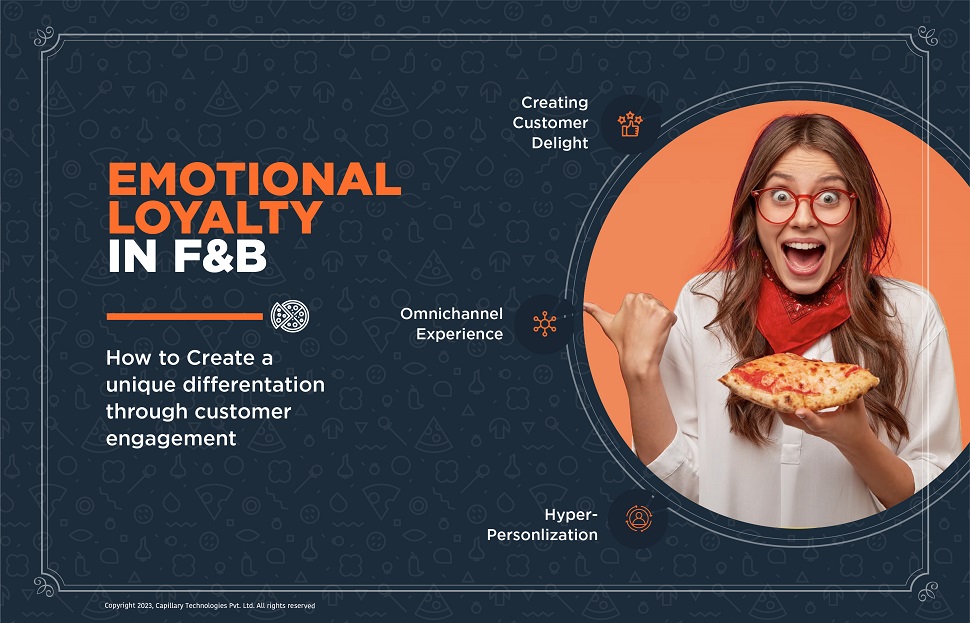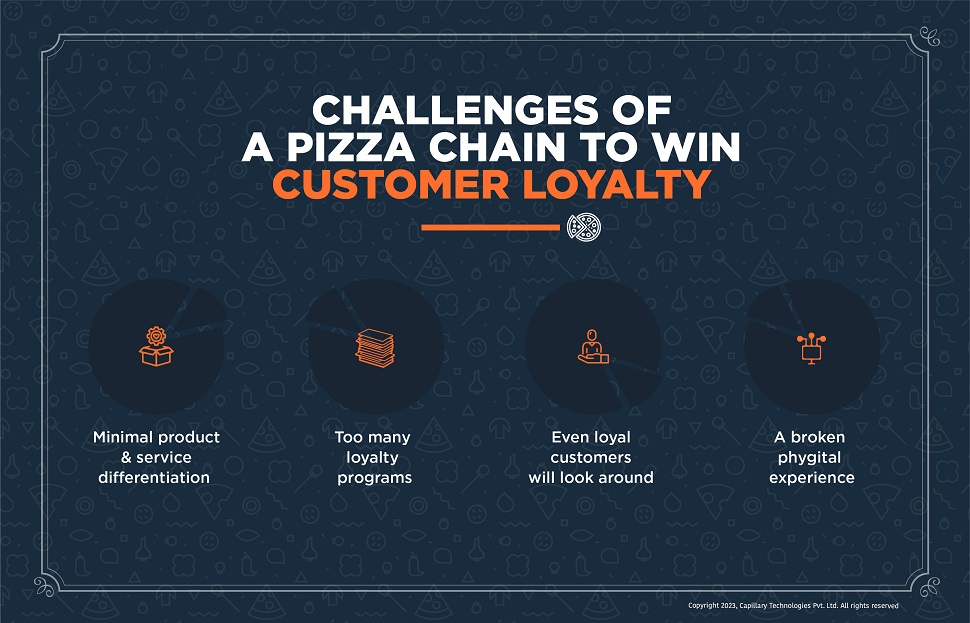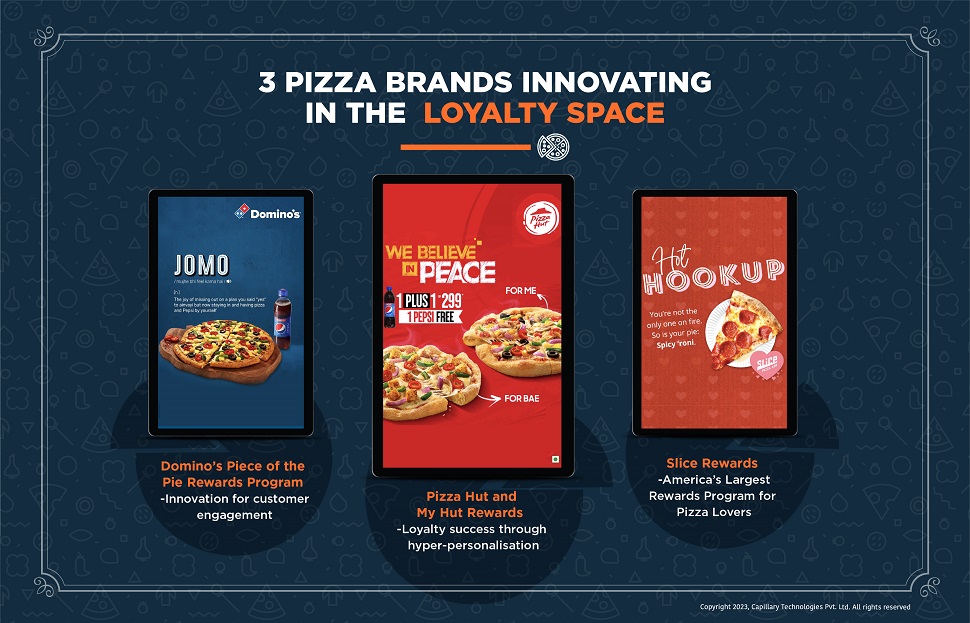9th February is celebrated as the International Pizza Day and it led us to an interesting conversation- what is the co-relationship pizza, F&B brands and building loyalty? For instance, Pizza Hut launched its first loyalty program in 2015. Domino’s recently launched a new Cheesy Rewards loyalty program and while an industry leader in loyalty like Starbucks got flack for some changes in its program. In this article, we go deep into the subject of loyalty for F&B brands, especially in context of a pizza chain.
Food & Beverage brands and Emotional Loyalty
Pizzas are a marketing & positioning masterstroke! A pizza can be a need (easy & filling food) and a want (satisfying the palate and taste craving). It is great with family and friends, solo or on a date! It is perfect for eating out, ordering in or ordering at work when staying back late on delivery deadlines. Come to think of it, it is surprising how easily a pizza fits into any situation – and so it is not surprising that most customers have at least one great memory connected with it.
So when a pizza brand becomes the creator of good memories, emotional loyalty (read about the science of emotional loyalty) follows and getting it right the first time, even if unknowingly, can be the beginning of a long relationship.
Challenges of a Pizza chain to win customer loyalty
While businesses across industries have to go the extra mile to build emotional loyalty, pizza brands can take customers from being first-timers to being loyalists with their very first pizza experience. The challenge then lies in understanding what is begetting customer loyalty and how it can be secured.
- Minimal product & service differentiation – Brands have constantly tried to innovate the pizza – base, toppings and all – but there’s only so much that can be done. Additionally the services that pizza chains offer are an industry standard. This really limits the play field for creating core differentiation to earn and keep loyalty, making it essential for pizza brands to create loyalty for reasons beyond pizza.
- Too many loyalty programs- On an average, the US consumer belongs to more than 16 loyalty programs. It’s a heavy downpour of deals, rewards and exclusive offers automated straight to their inbox. The danger then of customers forgetting about their enrolled program is a real one, and a back-of-the-mind loyalty program is no good.
- Even loyal customers will look around – A pizza chain may have a well-designed rewards program that works, but this is the business of serving taste buds after all and even loyal customers can look around for variety. They may choose to browse through offerings from other pizza brands or even non-competing brands with savory offerings – salads, croissants, perhaps noodles . So customer churn continues to be a possibility.
- A broken phygital experience- Some F&B brands are built for an in-dine first experience, some are built for a delivery first model. In both of these cases, it is crucial to collect data from physical and online touch points to build a 360 degree view of the customer. And doing this seamlessly is no easy task.
3 Pizza Brands innovating in the Loyalty Space
Here, we dive deep into thee interesting rewards programs from Pizza chains and pull out insights that can help F&B brands.
- Pizza Hut and My Hut Rewards – Loyalty success through hyper-personalization
Pizza Hut’s My Hut Rewards is a spends based program that rewards customers for every dollar spent and allows points to accrue without daily limits. Customers get 2 points for every $1 spent online or via mobile orders. 200 points earn them a free medium pizza with unlimited toppings and for 250 rewards points a large pizza with unlimited toppings. Pizza Hut leverages first-party customer data to derive insights and create hyper-personalized customer journeys which keeps them coming back for more.
- Knock knock. Who’s there? The welcome journey incentivizes customers with discounts to share first-party data. The shared customer insights such as dietary preferences and party size are used to tailor-make the offers and deliver a better experience.
- Offering personalized discounts – Discounts are offered based on the expected average order value (AOV). If the customer identifies as someone ordering for the family, they are likely to spend more and are offered a personalized discount bracket targeting a higher spend amount.
- Testing for loyalty acquisition – Through customer data-insights, Pizza Hut determined the value exchange that would be a better motivator in getting a customer to sign up for the rewards program. An email campaign then tested the marketing messages and introduced the loyalty schemes to each customer based on their response.
By delivering the right message at the right time, via the right channel, Hut’s Rewards Program drives a functional frictionless experience and succeeds in building meaningful relationships with the customers.
2. Domino’s Piece of the Pie Rewards Program – Innovation for customer engagement
Domino’s Piece of the Pie rewards program has 25 million+ active loyalty members. Anytime a customer places an order for $10 or more, they earn 10 points. Upon reaching 60 points a customer can either earn a free medium pizza or continue earning points and cash out later for multiple free pizzas. However, the customer can only earn points on one order per calendar day and points expire if the account is inactive for 180 days.
Keeping customers loyal to a pizza is tricky business and Domino’s works around that with out-of-the-box and industry-first digital innovations.
- Domino’s zero clicks app – The Zero Click app makes mobile ordering incredibly convenient. Once the app has been downloaded, customers link it to their existing Domino’s profile, and save all of their favorite orders. Then each time the Zero Click app is opened on a smartphone, it will prompt the Easy Order to be automatically re-ordered without asking consumers to tap, swipe or click anything. The app displays a 10-second countdown until the order goes through, giving customers ample opportunity to cancel it, in case of a mistake.
- ‘Piece of the Pie Pursuit’ Mobile Game – The Piece of the Pie Pursuit provides players with pizza-themed challenges and highlights different ways to order a Domino’s pizza. With six types of unique gameplay to keep customers / players coming back for more, the game also gives Piece of the Pie Rewards members a chance to earn real-world bonus points toward free pizza.
- Points for Pies Campaign –
Did Domino’s just say they will award points for eating any pizza? Even from a competitor?
Expanding on its existing rewards program, Domino’s Points-for-Pies campaign let customers earn rewards points by simply clicking pictures of any pizza! – whether it came from Domino’s, the grocery-store freezer, a neighborhood slice shop or anywhere else. Customers would earn 10 points for the scan and once they hit 60, they received a free medium two-topping Domino’s pizza. The hackvertising campaign ran for a 12-week window just in time for Super Bowl LIII and engaged with pizza lovers (customers or not).
By rethinking innovation and service to deliver faster, easier and better customer experiences (CX), Domino’s becomes the kind of brand customers would like to engage with, driving business growth and loyalty.
3. Slice Rewards – America’s Largest Rewards Program for Pizza Lovers
With 18,000+ local pizzerias in its network, Slice Rewards is the largest rewards program for pizza-lovers in the US.
Slice is an innovative tech platform that empowers local independent pizzerias with the tech and services they need to thrive. The pizzeria owners can offer their products to customers and the customers can place orders, customize, track and earn reward points via the Slice app. Unlike third-party food delivery apps, Slice partners directly with independent pizzerias and passes the savings directly to the customers.
- A first-of-its-kind loyalty program, Slice rewards customers for supporting local pizzerias across the US.
- Delivering on its promise of keeping things simple for independent pizzerias and customers alike, Slice’s tech platform auto-enrolls the customers of local pizzerias onto the Slice Rewards platform. Customers receive emails, reminders and notifications updating them on their journey and progress towards racking up Pizza Points, as they order from their favorite local pizza joints.
- Everytime a customer makes an order over $15, they earn 1 Pizza Point. Customers can redeem anywhere from 2 to 8 pizza points – offering a free topping for 2 points, a club soda for 4 points, garlic knots for 6 points and a free pizza for 8 points.
- Along with Slice rewards, customers also receive a variety of special offers, exclusive deals, and promotions.
Slice Rewards doesn’t create loyalty, rather protects and manages it. Slice acknowledges the loyalty that customers have for their neighborhood pizzeria and empowers it through convenience. In creating North America’s largest Pizza loyalty program, Slice Rewards delivers local diversity through their platform while creating value for the small business owners and customers alike.
Creating a Loyalty program that really works
Take an insight-based approach – Customers are willing to share information with brands in exchange for relevant engagement and meaningful experiences. While zero party data can provide insights into explicit interests and preferences, first party data is rich with behavioral information and implied interest. By leveraging both, pizza brands can determine the personal context for each customer and ways in which they want the brand to recognize them.
Go Phygital for end-to-end immersive CX – Having delivered the no-contact digital service counterparts to in-person interactions, brands can now create a seamless immersive CX that combines the best of both physical and digital (phygital) ecosystems. A common phygital execution would be for a pizza lover to arrive at the pizzeria with rewards points on the app profile notifying that a free pizza is due today. From making digital payments in-store to click-and-collect, curb-side pick up and QR code scannable menus, phygital experiences break channel silos to ensure a continued and cohesive brand experience throughout the customer journey. Greater the synergy between digital and physical, more efficient the service delivery and more satisfying the consumer experience.
Gamify – When each touch point on the customer journey can be gamified, which one should you choose? Whichever can help accomplish a specific brand or business outcome in the most fun manner possible – Is it possible to take an otherwise mechanical process and gamify it to reduce process drop-outs? Is it possible to build a community of pizza lovers and create brand advocates for your upcoming campaign? Is it possible to evolve relationships with customers who are otherwise engaging with the brand in a purely transactional manner? Gamification makes it possible to bypass the business-customer role play, builds emotional affinity and better engagement.
Going beyond for a beyond reach – A successful loyalty program looks to create value for the customer in their daily lives within and outside the brand’s ecosystem. Go beyond to include offerings from other brands that share the same values as yours and brands your customers enjoy engaging with in their daily routine. The more frequently and variedly a customer can leverage the rewards program each day, the longer they would like to stay enrolled.
The cardinal Do Not – Previously when digital engagement was non-existent, brands were non-intrusive by default. Now with customers open to an omnichannel phygital engagement, brands must be specific about when, how and how often to engage with them. Value stepping back as much as stepping-in to ensure customers stay onboard to receive what is served next.
The pre-pandemic customer is no longer walking in through the front doors and brands would do good to consider every customer as a new customer. In this initial phase of digital loyalty for F&B industry, new user sign-ups are fueling sales and growth. As the curve stabilizes, prospects will be more certain of the benefits they seek and what they are willing to exchange for it. An intimate and complete understanding of customers in real-time will be essential to deliver total and meaningful engagement and meet more than expressed expectations.


